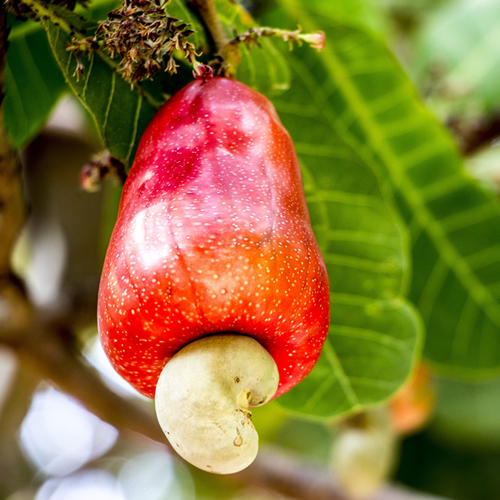
Cashew
Scientific names: Anacardium occidentale
Family: Anarcardiaceae
Alternative names: Acajou oil, Anacarde, Anacardier, Anacardo, Cajou, Cajuil, Cashew Oil, East Indian Almond, Kaju, Marañon, Noix d'Anacarde, Noix-Cajou, Noix de Cajou, Oleum Anacardiae, Pomme-Cajou
Actions: Angiotensin II receptor inhibition, Antibacterial, Anticancer, Antidiarrheal, Antifungal, Anti-inflammatory, Antioxidant, Antiviral, Calcium channel blockade, Dermatologic, Immunomodulating
Background
Cashew is a tree that is native to Brazil. It also grows in parts of Asia and Africa. Its nut, also known as cashew, is commonly eaten as food. People also use the nut to make medicine.
Cashew is used for diabetes, high cholesterol, heart disease, stomach and intestinal (gastrointestinal) ailments, skin problems, and other conditions, but there is no good scientific evidence to support these uses.
Cashew is used for diabetes, high cholesterol, heart disease, stomach and intestinal (gastrointestinal) ailments, skin problems, and other conditions, but there is no good scientific evidence to support these uses.
Safety Safety definitions
When taken by mouth: Cashew is LIKELY SAFE in normal food amounts. It is POSSIBLY SAFE when used as a medicine at up to 11% of calories in the diet. Some people are allergic to cashew. Cashew nuts may also cause bloating, constipation, weight gain, and joint swelling in some people. But these side effects are rare.
When applied to the skin: There isn't enough reliable information to know if cashew is safe. If the unroasted cashew is used it might cause skin irritation, redness, and blisters. Some people are allergic to cashew when touched.
Allergy to certain other nuts or pectin: Cashew might cause allergic reactions in people who are sensitive to hazelnut, Brazil nut, pistachio, almond, peanut, sumac, mango, pink peppercorn, citrus seeds, yuzu, or pectin. If you have allergies, be sure to check with your healthcare provider before taking cashew.
Diabetes: Eating large amounts of cashew might increase blood sugar levels. But not all research agrees. If you have diabetes and use cashew, be sure to monitor you blood sugar carefully. The doses of your diabetes medications might need to be adjusted.
Surgery: Since cashew might affect blood sugar levels, there is some concern that it might interfere with blood sugar control during and after surgery. Stop eating large amounts of cashew at least 2 weeks before a scheduled surgery.
When applied to the skin: There isn't enough reliable information to know if cashew is safe. If the unroasted cashew is used it might cause skin irritation, redness, and blisters. Some people are allergic to cashew when touched.
Special Precautions & Warnings:
Pregnancy and breast-feeding: There isn't enough reliable information to know if cashew is safe to use as medicine when pregnant or breast-feeding. Stay on the safe side and stick with food amounts.Allergy to certain other nuts or pectin: Cashew might cause allergic reactions in people who are sensitive to hazelnut, Brazil nut, pistachio, almond, peanut, sumac, mango, pink peppercorn, citrus seeds, yuzu, or pectin. If you have allergies, be sure to check with your healthcare provider before taking cashew.
Diabetes: Eating large amounts of cashew might increase blood sugar levels. But not all research agrees. If you have diabetes and use cashew, be sure to monitor you blood sugar carefully. The doses of your diabetes medications might need to be adjusted.
Surgery: Since cashew might affect blood sugar levels, there is some concern that it might interfere with blood sugar control during and after surgery. Stop eating large amounts of cashew at least 2 weeks before a scheduled surgery.
Effectiveness
Effective Effectiveness definitions
There is interest in using cashew for a number of purposes, but there isn't enough reliable information to say whether it might be helpful.
Dosing & administration
The appropriate dose of cashew for use as treatment depends on several factors such as the user's age, health, and several other conditions. At this time there is not enough scientific information to determine an appropriate range of doses for cashew. Keep in mind that natural products are not always necessarily safe and dosages can be important. Be sure to follow relevant directions on product labels and consult your pharmacist or physician or other healthcare professional before using.
Interactions with pharmaceuticals
Medications for diabetes (Antidiabetes drugs)
Interaction Rating=Moderate Be cautious with this combination.
Cashew might increase blood sugar when eaten in large amounts. Diabetes medications are used to lower blood sugar. Taking cashew along with diabetes medications might decrease the effects of diabetes medications. Monitor your blood sugar closely. The dose of your diabetes medication might need to be changed.
Some medications used for diabetes include glimepiride (Amaryl), glyburide (DiaBeta, Glynase PresTab, Micronase), insulin, pioglitazone (Actos), rosiglitazone (Avandia), chlorpropamide (Diabinese), glipizide (Glucotrol), tolbutamide (Orinase), and others.
Interactions with herbs & supplements
There are no known interactions with herbs and supplements.
Interactions with foods
There are no known interactions with foods.
Action
Cashew contains chemicals that might work against certain bacteria. Some of the fats in cashew might help to lower cholesterol levels in the blood.
Products
View all productsPer bar (Cashew Shortbread):
- Anacardium occidentale (Cashew nut)
- Bovine collagen peptides
- Tapioca
- Maple syrup
- Medium Chain Triglycerides (powder) (MCT)
- Acacia sp. (fibre)
- Myrciaria dubia (fruit) powder (Camu Camu)
- Siraitia grosvenorii (Monk fruit)
- Vanilla planifolia (Vanilla bean extract)
12 bars Cashew Shortbread
$54.95
Create account
Per bar:
- Anacardium occidentale (Cashew nut)
- Vicia faba (Fava bean protein)
- Prebiotic fibre
- Vitis vinifera juice
- Theobroma cacao powder
- L-glutamine
- Theobroma cacao (Cocoa mass)
- Coconut sugar
- Theobroma cacao (Cocoa solids)
- Natural vanilla flavour
- Ananas comosus (Pineapple)
- Coconut flesh (dried)
- Ananas comosus (Pineapple oil)
- Oryza sativa (Rice juice concentrate)
RRP: $66.00$59.40Save: 10%
Discontinued by Switch Nutrition
Create account
vital.ly has licensed monographs from TRC Healthcare.
This monograph was last reviewed on 07/04/2025 10:00:00 and last updated on 22/01/2022 10:14:55. Monographs are reviewed and/or updated multiple times per month and at least once per year.
Natural Medicines disclaims any responsibility related to medical consequences of using any medical product. Effort is made to ensure that the information contained in this monograph is accurate at the time it was published. Consumers and medical professionals who consult this monograph are cautioned that any medical or product related decision is the sole responsibility of the consumer and/or the health care professional. A legal License Agreement sets limitations on downloading, storing, or printing content from this Database. No reproduction of this monograph or any content from this Database is permitted without written permission from the publisher. It is unlawful to download, store, or distribute content from this site.




